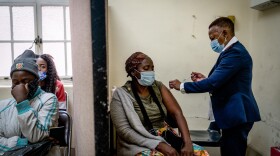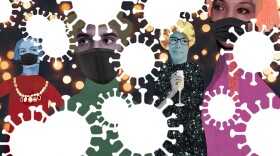
Michaeleen Doucleff
Michaeleen Doucleff, PhD, is a correspondent for NPR's Science Desk. For nearly a decade, she has been reporting for the radio and the web for NPR's global health outlet, Goats and Soda. Doucleff focuses on disease outbreaks, cross-cultural parenting, and women and children's health.
In 2014, Doucleff was part of the team that earned a George Foster Peabody award for its coverage of the Ebola outbreak in West Africa. For the series, Doucleff reported on how the epidemic ravaged maternal health and how the virus spreads through the air. In 2019, Doucleff and Senior Producer Jane Greenhalgh produced a story about how Inuit parents teach children to control their anger. That story was the most popular one on NPR.org for the year; altogether readers have spent more than 16 years worth of time reading it.
In 2021, Doucleff published a book, called Hunt, Gather, Parent, stemming from her reporting at NPR. That book became a New York Times bestseller.
Before coming to NPR in 2012, Doucleff was an editor at the journal Cell, where she wrote about the science behind pop culture. Doucleff has a bachelor degree in biology from Caltech, a doctorate in physical chemistry from the University of Berkeley, California, and a master's degree in viticulture and enology from the University of California, Davis.
-
Scientists are beginning to come up with answers to the question of how long antibodies from an infection can protect you — and what they'll protect you from.
-
Researchers in the U.K. have the first estimates for how long a third shot of the Pfizer vaccine will last. The findings are mixed.
-
A look at the data that omicron is less severe. What does that mean for the future of SARS-CoV-2 — and the pandemic?
-
Researchers are looking at data from U.S. cases to determine if the variant causes milder disease. Even if the answer is yes, they say, rates of hospitalization could be high during the surge.
-
Vaccines still do a solid job at warding off hospitalization from omicron. So if you're young and healthy, why get a booster? Scientists explain how boosters help and the best timing to get one.
-
A new study from the University of Hong Kong offers preliminary information that could explain why this new coronavirus variant may be more transmissible.
-
Data from 78,000 South Africans with COVID show the Pfizer vaccine is far less effective in preventing infection by the omicron variant. But there is still significant protection from severe illness.
-
In small studies in South Africa and in Germany, the results indicate a marked decrease in the ability of vaccines to neutralize this variant. But there are other findings that are encouraging.
-
You might want to cancel that holiday party, and definitely dust off your face mask. Don't panic, but do step up your precautions. Here's how.
-
"This wave seems much faster than the delta wave. And we thought the delta wave was really fast. It's unbelievable," says Juliet Pulliam, the scientist who presented the new analysis at a conference.









